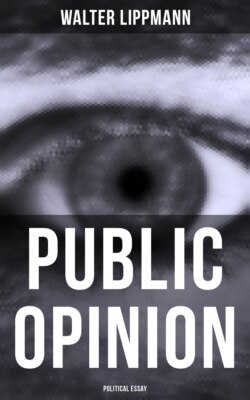Читать книгу Public Opinion: Political Essay - Walter Lippmann - Страница 9
На сайте Литреса книга снята с продажи.
4
ОглавлениеThe analyst of public opinion must begin then, by recognizing the triangular relationship between the scene of action, the human picture of that scene, and the human response to that picture working itself out upon the scene of action. It is like a play suggested to the actors by their own experience, in which the plot is transacted in the real lives of the actors, and not merely in their stage parts. The moving picture often emphasizes with great skill this double drama of interior motive and external behavior. Two men are quarreling, ostensibly about some money, but their passion is inexplicable. Then the picture fades out and what one or the other of the two men sees with his mind's eye is reënacted. Across the table they were quarreling about money. In memory they are back in their youth when the girl jilted him for the other man. The exterior drama is explained: the hero is not greedy; the hero is in love.
A scene not so different was played in the United States Senate. At breakfast on the morning of September 29, 1919, some of the Senators read a news dispatch in the Washington Post about the landing of American marines on the Dalmatian coast. The newspaper said:
FACTS NOW ESTABLISHED
"The following important facts appear already established. The orders to Rear Admiral Andrews commanding the American naval forces in the Adriatic, came from the British Admiralty via the War Council and Rear Admiral Knapps in London. The approval or disapproval of the American Navy Department was not asked….
WITHOUT DANIELS' KNOWLEDGE
"Mr. Daniels was admittedly placed in a peculiar position when cables reached here stating that the forces over which he is presumed to have exclusive control were carrying on what amounted to naval warfare without his knowledge. It was fully realized that the British Admiralty might desire to issue orders to Rear Admiral Andrews to act on behalf of Great Britain and her Allies, because the situation required sacrifice on the part of some nation if D'Annunzio's followers were to be held in check.
"It was further realized that under the new league of nations plan foreigners would be in a position to direct American Naval forces in emergencies with or without the consent of the American Navy Department…." etc. (Italics mine).
The first Senator to comment is Mr. Knox of Pennsylvania. Indignantly he demands investigation. In Mr. Brandegee of Connecticut, who spoke next, indignation has already stimulated credulity. Where Mr. Knox indignantly wishes to know if the report is true, Mr. Brandegee, a half a minute later, would like to know what would have happened if marines had been killed. Mr. Knox, interested in the question, forgets that he asked for an inquiry, and replies. If American marines had been killed, it would be war. The mood of the debate is still conditional. Debate proceeds. Mr. McCormick of Illinois reminds the Senate that the Wilson administration is prone to the waging of small unauthorized wars. He repeats Theodore Roosevelt's quip about "waging peace." More debate. Mr. Brandegee notes that the marines acted "under orders of a Supreme Council sitting somewhere," but he cannot recall who represents the United States on that body. The Supreme Council is unknown to the Constitution of the United States. Therefore Mr. New of Indiana submits a resolution calling for the facts.
So far the Senators still recognize vaguely that they are discussing a rumor. Being lawyers they still remember some of the forms of evidence. But as red-blooded men they already experience all the indignation which is appropriate to the fact that American marines have been ordered into war by a foreign government and without the consent of Congress. Emotionally they want to believe it, because they are Republicans fighting the League of Nations. This arouses the Democratic leader, Mr. Hitchcock of Nebraska. He defends the Supreme Council: it was acting under the war powers. Peace has not yet been concluded because the Republicans are delaying it. Therefore the action was necessary and legal. Both sides now assume that the report is true, and the conclusions they draw are the conclusions of their partisanship. Yet this extraordinary assumption is in a debate over a resolution to investigate the truth of the assumption. It reveals how difficult it is, even for trained lawyers, to suspend response until the returns are in. The response is instantaneous. The fiction is taken for truth because the fiction is badly needed.
A few days later an official report showed that the marines were not landed by order of the British Government or of the Supreme Council. They had not been fighting the Italians. They had been landed at the request of the Italian Government to protect Italians, and the American commander had been officially thanked by the Italian authorities. The marines were not at war with Italy. They had acted according to an established international practice which had nothing to do with the League of Nations.
The scene of action was the Adriatic. The picture of that scene in the Senators' heads at Washington was furnished, in this case probably with intent to deceive, by a man who cared nothing about the Adriatic, but much about defeating the League. To this picture the Senate responded by a strengthening of its partisan differences over the League.
